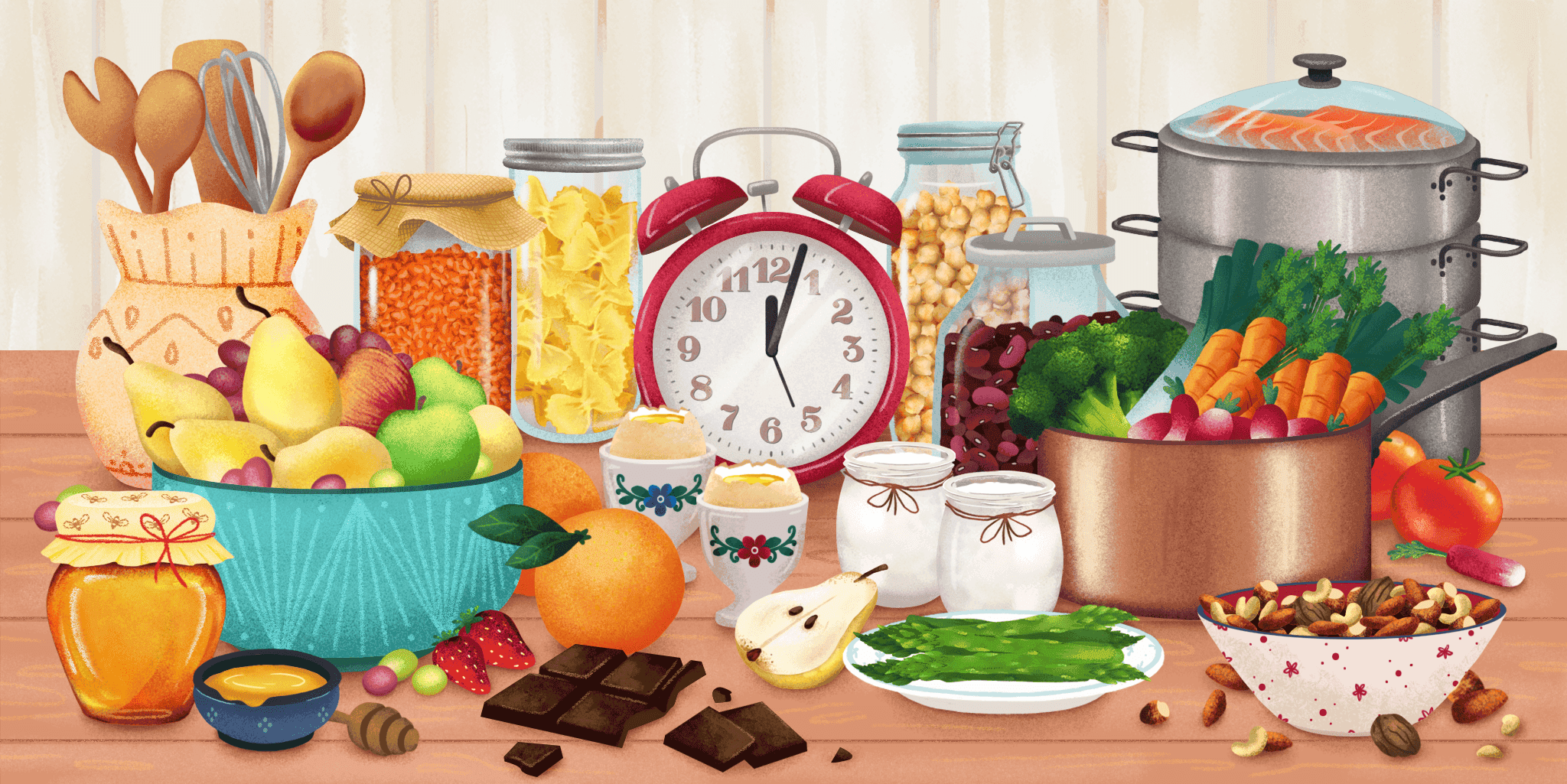
Nutrition is often regarded as the first form of medicine. Indeed, it plays a fundamental role in our health! This article presents 10 essential keys to adopting simple dietary habits that can optimize your health and well-being.
1. Have a savory breakfast!
Most of us eat cereal with milk or buttered white toast with jam alongside a tall glass of orange juice for breakfast. But that breakfast is far from ideal in terms of nutrition. Indeed, that kind of overly sugary meal encourages insulin secretion, which should be avoided — especially in the morning.
It’s best to opt for a savory breakfast. Eating protein in the morning promotes the production of dopamine, a neurotransmitter that stimulates the mind and jump-starts your motivation. In addition to making you more motivated and alert, consuming protein at breakfast can also help you feel full longer and reduce snacking later in the morning.
Eggs are the perfect solution because they contain extremely high quality protein and are rich in vitamins and minerals. But there are other protein sources you can try for variety:
 | Animal protein: one ounce of cheese (preferably goat or sheep milk), a yogurt (goat or sheep milk), sardines or a slice of good ham (from time to time) |
 | Plant-based protein: soy-based vegan pudding packed with protein, chia seeds, nuts (almonds, walnuts, hazelnuts, etc.) |
2. Eat at least 2 to 3 fruits and 2 to 3 servings of vegetables a day
A daily intake of 28 to 32 oz of fruit and vegetables is ideal, i.e. 2 to 3 servings of vegetables (17 oz) and 2 to 3 fruits. For lunch and dinner, choose at least one raw and one cooked fruit or vegetable.
After all, fresh fruits and vegetables are very high in fiber, which has an essential role to optimizing our health. It contributes to satiety and therefore plays an important role in weight management, it helps regulate our blood sugar levels, and it also facilitates digestion and helps balance our gut microbiota.
Fruits and vegetables are also rich in vitamins, minerals and antioxidants. Getting the right amount of antioxidants is particularly important for preventing cancer, degenerative diseases and cardiovascular disease.
Vary the fruits and vegetables on your plate and their colors as much as possible to reap all their benefits!
Warning: fruit juice is not the same as fruit! Juice lacks the fiber that regulates the rate at which sugars are assimilated, so its glycemic index is much higher than that of whole fruit.
3. Eat good fat
The quest to eliminate fat has no scientific or biological basis. In fact, “good fats” are responsible for the proper development of eyesight, brain membranes and neural connections. In addition to being good for the brain, they help reduce cardiovascular risks. So good fat is a crucial ally for good health!
But not all fats are created equal! The problem is not that we eat too much fat these days, but that we eat too much bad fat.
Limit your intake of saturated fats and omega-6, which are currently over-consumed. These fats are found in animal products (meat, butter, cheese, etc.), in some vegetable oils (sunflower, coconut, palm, grape seed) and above all in many processed products (cookies, potato chips, etc.).
On the other hand, make sure you get plenty of omega-3 fatty acids! Omega-3 fatty acids occur primarily in fatty fish (tuna, salmon, mackerel, sardines, etc.), certain oils (canola, linseed, walnut), seeds (chia, flax, hemp) and in some vegetables in very small quantities (watercress, lamb’s lettuce, cabbage). Caution: do not consume tuna or salmon more than once a week, as they generally contain high levels of various pollutants, including heavy metals (mercury, PCBs, dioxins, etc.).
Choose products rich in omega-9 fatty acids. Omega-9 fatty acids occur in large quantities in olive oil, hazelnut oil, avocado, hazelnuts and almonds. In view of the environmental impact of avocados, we recommend eating them only occasionally.
4. Take the time to chew
Chewing may seem like a trivial step and is often neglected; however, it plays an essential role in our health.
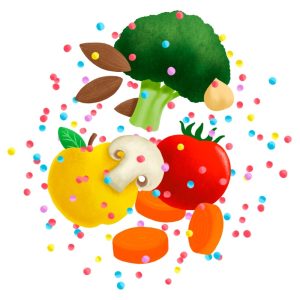 | Better nutrient absorption: good chewing transforms food into nutrients that reach our cells more effectively. |
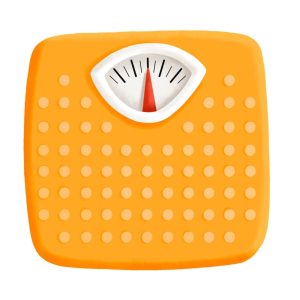 | Eating less and managing weight: chewing triggers various hormones that send a satiety signal to the brain during the meal. |
 | Improving digestion: insufficient chewing forces the stomach to produce more gastric juice to break down large pieces. This excess acid can irritate the digestive lining and cause acid reflux. |
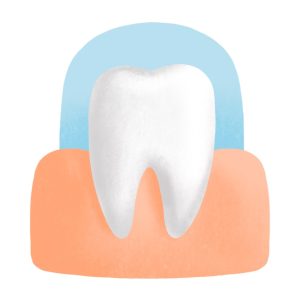 | Protecting teeth and gums: chewing helps prevent cavities by stimulating saliva production, which cleans dental plaque and protects enamel from acidity. It also exercises our gums, essential for good dental health. |
5. Fill up on antioxidants
Antioxidants are extremely beneficial molecules that are crucial to cell protection. They help guard against various afflictions, such as premature skin aging, cancer, degenerative disorders, cataracts, arthritis and cardiovascular disease.
The good news is that these miracle workers occur all around us in our food. Eating generous amounts of fruits and vegetables is usually enough to cover the body’s needs. Here are some foods with particularly high antioxidant properties:
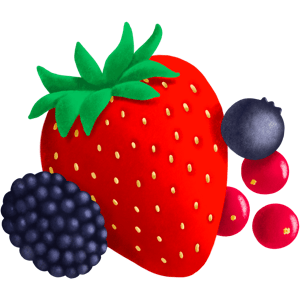 | Berries: blueberries, blackberries, goji berries, acai berries, raspberries, strawberries |
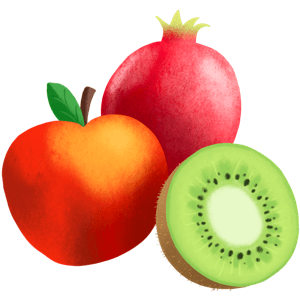 | Other fruits: apples, plums, pomegranates, oranges, kiwis, grapes, figs |
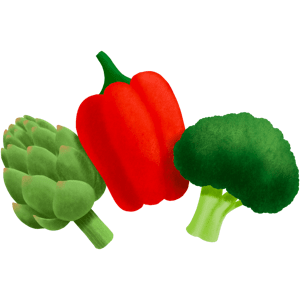 | Vegetables: artichokes, cabbages, broccoli, spinach, bell peppers |
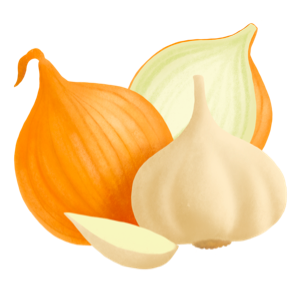 | Allium family: onion, garlic, shallot |
 | Spices: cloves, ginger, turmeric, cinnamon |
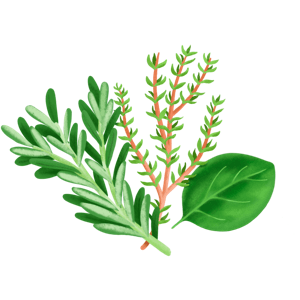 | Herb: thyme, basil, oregano, parsley, chives, dill, mint, rosemary, bay leaf |
 | Hot beverages: tea and coffee |
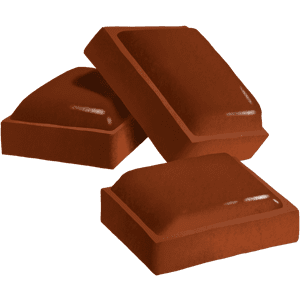 | Cacao and chocolate: pure cocoa powder, dark chocolate (at least 70% cacao) |
You should eat organic versions of these foods because organically grown foods have 20% to 70% more polyphenols (a type of antioxidant found in many vegetables) than conventionally grown foods.
6. Eat mindfully
In our busy lives, many of us eat breakfast at breakneck speed, or gobble up lunch in front of our computers to make the most of our time. We are completely disconnected from our relationship with food.
However, it is important to devote at least 20 minutes to each meal. Mindfulness is about considering a moment in its own right, and paying attention to what we eat.
Applying mindfulness to our eating habits will have several beneficial impacts. First, it enables us to listen to our hunger and satiety signals and ensure that our intake is adapted to our needs. This will reduce the quantities we consume and our cravings for snacks.
Mindful eating also helps develop a preference for healthier foods: when we eat impulsively and emotionally without listening to our bodies, we no longer feel the pleasure of eating, and we are more susceptible to fatty, sweet and salty foods.
Finally, mindfulness also contributes to mental well-being. It allows you to observe your feelings without judgment, and to listen to yourself. Thinking only of the present moment during a meal also helps to still the mind and lower stress and anxiety.
7. Limit your salt intake
Salt is essential to proper body function, but excessive consumption can lead to the development of certain diseases. Today, we consume more than twice as much salt than we really need!
Excessive salt intake increases the risk of high blood pressure. Hypertension itself can lead to heart disease and even stroke. Salt consumption also increases the risk of cancer and stomach ulcers.
There are simple ways to reduce salt intake:
- Limit foods high in salt: ready-made meals, potato chips, cold cuts, pizza, sauces, cheese, etc.
- Opt for alternatives to add flavor to dishes, such as garlic, onion, thyme, chives, basil, lemon, pepper, curry, paprika and all sorts of spices.
- Taste before salting
- Do not add salt to cooking water
- Remove the salt shaker from the table
8. Go vegetarian at dinner
It is recommended to prepare a vegetarian dinner, meaning no meat, fish or eggs. This type of meal will help pave the way for a good night’s sleep.
So, for dinner you should opt for plant-based protein rather than animal protein. Indeed, animal protein encourages the production of dopamine, a neurotransmitter responsible for alertness and motivation. While it is perfect in the morning to rev you up, at night the body needs to make serotonin, a neurotransmitter associated with soothing and sleep regulation.
Serotonin is made from tryptophan, an amino acid found in plant-based protein, such as legumes, soy, brown rice, sunflower seeds and chocolate. The carbohydrates found in legumes and grain products also help optimize serotonin production.
Some foods promote serotonin production, which optimizes sleep quality:
 | Walnuts and almonds: in addition to tryptophan, they contain magnesium, a lack of which can be linked to sleep disorders. |
 | Carbohydrates (from whole grains and fruits): thanks to insulin secretion, their amino acids will be directed to the brain rather than the muscles. That will make room for tryptophan in the brain, so it is more readily available for serotonin production. |
Furthermore, animal proteins and cooked fats are very demanding for the digestive system: they are made up of molecules that can take a long time to digest.
9. Opt for low-temperature cooking
Cooking at high temperatures erodes the nutritional quality of food: it leads to the destruction of certain vitamins and minerals. Some vitamins are very sensitive to heat, and foods can easily lose 50% of their initial vitamin content during cooking. The longer the cooking time and the higher the temperature, the lower the nutritional content of the food.
In addition, browning food during cooking is accompanied by the production of Maillard bodies, compounds which, in excessive quantities, can increase the risk of developing certain cancers.
Opt for low-temperature cooking, i.e. below 210°F. The most useful method is gently steaming your foods.
10. Eat raw foods and avoid processed foods
Raw food is a product that is sold in its original form and has not undergone any
processing: fruit and vegetables, legumes, eggs, fish, etc. Conversely, processed products
are those that have undergone some form of transformation in order to be sold and which do not occur in this form in nature: ready-made meals, fruit juices and soft drinks, cookies, etc.
Ultra-processed foods have problematic health effects: they are often low in nutrients with a high glycemic load. What’s more, they generally contain little fiber and their texture can be too soft to be satiating.
Finally, consuming processed foods throws the gut microbiota out of balance. As a result, the intestinal microbiota has fewer good bacteria, which are essential to proper body function since they fight pathogens (e.g. parasites and bacteria) and perform essential functions to prevent lifestyle diseases.
Here are some tips for avoiding processed foods:
 | Go with short ingredient lists, meaning no more than 4 or 5 ingredients. |
 | Avoid products whose ingredient list includes items with complicated names (glucose-fructose syrup, hydrolyzed proteins, modified starch, etc.). |
 | Choose products without problematic additives. Of course, you can use Yuka for this! |
 | Eat as many raw, unprocessed products as possible, that you have prepared and cooked yourself. |
- Hu FB, Stampfer MJ, Rimm EB et al. A prospective study of egg consumption and risk of cardiovascular disease in men and women. JAMA. 1999;281:1387-1394.
- Vorster HH, Benade AJ, Barnard HC et al. Egg intake does not change plasma lipoprotein and coagulation profiles. Am J Clin Nutr. 1992;55:400-410.
- Katz DL, Evans MA, Nawaz H et al. Egg consumption and endothelial function: a randomized controlled crossover trial. Int J Cardiol. 2005;99:65-70.
- Howell WH, McNamara DJ et al. Plasma lipid and lipoprotein responses to dietary fat and cholesterol: a meta-analysis. Am J Clin Nutr. 1997;65:1747-1764.
- Krauss RM, Eckel RH, Howard B et al. AHA Dietary Guidelines: revision 2000: A statement for healthcare professionals from the Nutrition Committee of the American Heart Association. Stroke. 2000;31:2751-2766.
- Swanson D, Block R, Mousa SA. Omega-3 fatty acids EPA and DHA: health benefits throughout life. Adv Nutr. 2012 Jan;3(1):1-7. doi: 10.3945/an.111.000893. Epub 2012 Jan 5. Review.
- Nichols PD, McManus A, Krail K, Sinclair AJ, Miller M. Recent advances in omega-3: Health Benefits, Sources, Products and Bioavailability. Nutrients. 2014;6(9):3727–3733. Published 2014 Sep 16.
- Étude individuelle nationale des consommations alimentaires 3 (INCA 3) – Avis de l’Anses – Rapport d’expertise collective.
- Delgado GE, Krämer BK, Lorkowski S, März W, von Schacky C, Kleber ME. Individual omega-9 monounsaturated fatty acids and mortality-The Ludwigshafen Risk and Cardiovascular Health Study. J Clin Lipidol. 2017 Jan – Feb;11(1):126-135.e5
- Flood-Obbagy, J. E.; Rolls, B. J. The Effect of Fruit in Different Forms on Energy Intake and Satiety at a Meal. Appetite 2009, 52 (2), 416–422.
- Dagfinn Aune, Edward Giovannucci, Paolo Boffetta, Lars T. Fadnes, NaNa Keum, Teresa Norat, Darren C. Greenwood, Elio Riboli, Lars J. Vatten, Serena Tonstad. Fruit and vegetable intake and the risk of cardiovascular disease, total cancer and all-cause mortality–a systematic review and dose-response meta-analysis of prospective studies. International Journal of Epidemiology, 2017; DOI: 10.1093/ije/dyw319
- Tavoularis G., Hébel P., «Fruits et légumes : les Français suivent de moins en moins la recommandation», in: Consommations et modes de vies, CREDOC, n°292, ISSN 0295-9976, Juillet 2017
- Etude NutriNet-Sante : https://info.etude-nutrinet-sante.fr/protectednew/pdf/DOSSIER_PRESSE_Nutrinet-Sante_22_11_12.pdf
- Feder D, Fonseca FLA. Chapter 2 – The Mechanism of Fiber Effects on Insulin Resistance. In: Samaan RA, ed. Dietary Fiber for the Prevention of Cardiovascular Disease. Academic Press; 2017:23-33.
- Patel S. Anti-Obesity and Anti-Diabetes Foods: High Fibre Diets. In: Melton L, Shahidi F, Varelis P, eds. Encyclopedia of Food Chemistry. Oxford: Academic Press; 2019:248-252.
- De Vadder F, Kovatcheva-Datchary P, Goncalves D, Vinera J, Zitoun C, Duchampt A, Bäckhed F, Mithieux G. Microbiota-generated metabolites promote metabolic benefits via gut-brain neural circuits. Cell. 2014 Jan 16;156(1-2):84-96.
- Threapleton DE, Greenwood DC, Evans CE, Cleghorn CL, Nykjaer C, Woodhead C, Cade JE, Gale CP, Burley VJ. Dietary fibre intake and risk of cardiovascular disease: systematic review and meta-analysis. BMJ. 2013 Dec 19;347:f6879.
- Imai S, Fukui M, Kajiyama S. Effect of eating vegetables before carbohydrates on glucose excursions in patients with type 2 diabetes. J Clin Biochem Nutr. 2014 Jan;54(1):7-11.
- BROWNLEE, Iain A., CHATER, Peter I., PEARSON, Jeff P., et al. Dietary fibre and weight loss: Where are we now?. Food Hydrocolloids, 2017, vol. 68, p. 186-191.
- Chandalia M, Garg A, Lutjohann D, von Bergmann K, Grundy SM, Brinkley LJ.
- Beneficial effects of high dietary fiber intake in patients with type 2 diabetes mellitus. N Engl J Med. 2000 May 11;342(19):1392-8.
- Kim Y, Je Y. Dietary fibre intake and mortality from cardiovascular disease and all cancers: A meta-analysis of prospective cohort studies. Arch Cardiovasc Dis. 2016 Jan;109(1):39-54.
- Siri-Tarino, P. W., Sun, Q., Hu, F. B., & Krauss, R. M. (2010). Saturated fat, carbohydrate, and cardiovascular disease. The American journal of clinical nutrition, 91(3), 502-509.
- DiNicolantonio JJ, Lucan SC, O’Keefe JH. The Evidence for Saturated Fat and for Sugar Related to Coronary Heart Disease. Prog Cardiovasc Dis. 2016 Mar-Apr;58(5):464-72. doi: 10.1016/j.pcad.2015.11.006. Epub 2015 Nov 14. Review.
- Patterson E, Wall R, Fitzgerald GF, Ross RP, Stanton C. Health implications of high dietary omega-6 polyunsaturated Fatty acids. J Nutr Metab. 2012;2012:539426.
- Innes JK, Calder PC. Omega-6 fatty acids and inflammation. Prostaglandins Leukot Essent Fatty Acids. 2018 May;132:41-48. doi: 10.1016/j.plefa.2018.03.004. Epub 2018 Mar 22. Review.
- Simopoulos AP. The importance of the ratio of omega-6/omega-3 essential fatty acids. Biomed Pharmacother. 2002 Oct;56(8):365-79. Review. PubMed PMID: 12442909.
- Simopoulos AP. An Increase in the Omega-6/Omega-3 Fatty Acid Ratio Increases the Risk for Obesity. Nutrients. 2016;8(3):128. Published 2016 Mar 2.
- DiNicolantonio JJ, O’Keefe JH. Importance of maintaining a low omega-6/omega-3 ratio for reducing inflammation. Open Heart. 2018;5(2):e000946. Published 2018 Nov 26.
- de Lorgeril M, Salen P. New insights into the health effects of dietary saturated and omega-6 and omega-3 polyunsaturated fatty acids. BMC Med. 2012;10:50. Published 2012 May 21.
- Bernard, Carole & Vanduffel, Steven & Ye, Jiang, 2019. « Optimal strategies under Omega ratio, » European Journal of Operational Research, Elsevier, vol. 275(2), pages 755-767.
- Dhaka V, Gulia N, Ahlawat KS, Khatkar BS. Trans fats-sources, health risks and alternative approach – A review. J Food Sci Technol. 2011;48(5):534–541.
- Iqbal MP. Trans fatty acids – A risk factor for cardiovascular disease. Pak J Med Sci. 2014;30(1):194–197.
- Mozaffarian D, Aro A, Willett WC. Health effects of trans-fatty acids: experimental and observational evidence. Eur J Clin Nutr. 2009 May;63 Suppl 2:S5-21.
- Shah B, Thadani U. Trans fatty acids linked to myocardial infarction and stroke: What is the evidence? Trends Cardiovasc Med. 2019 Jul;29(5):306-310. doi: 10.1016/j.tcm.2018.09.011. Epub 2018 Sep 19. Review. PubMed PMID: 31130187.
- Okubo H, Murakami K, Masayasu S, Sasaki S. The Relationship of Eating Rate and Degree of Chewing to Body Weight Status among Preschool Children in Japan: A Nationwide Cross-Sectional Study. Nutrients. 2018;11(1):64. Published 2018 Dec 29.
- Zhu Y, Hollis JH. Relationship between chewing behavior and body weight status in fully dentate healthy adults. Int J Food Sci Nutr. 2015 Mar;66(2):135-9.
- Ashiga H, Takei E, Magara J, et al. Effect of attention on chewing and swallowing behaviors in healthy humans. Sci Rep. 2019;9(1):6013. Published 2019 Apr 12.
- N’gom PI, Woda A. Influence of impaired mastication on nutrition. J Prosthet Dent. 2002;87(6):667-673.
- Mann T, Heuberger R, Wong H. The association between chewing and swallowing difficulties and nutritional status in older adults. Aust Dent J. 2013;58(2):200-206.
- Furuta M, Yamashita Y. Oral Health and Swallowing Problems. Curr Phys Med Rehabil Rep. 2013;1(4):216-222. Published 2013 Sep 15.
- Furuta M, Komiya-Nonaka M, Akifusa S, Shimazaki Y, Adachi M, Kinoshita T, Kikutani T, Yamashita Y. Interrelationship of oral health status, swallowing function, nutritional status, and cognitive ability with activities of daily living in Japanese elderly people receiving home care services due to physical disabilities. Community Dent Oral Epidemiol. 2013 Apr;41(2):173-81.
- Miquel-Kergoat S, Azais-Braesco V, Burton-Freeman B, Hetherington MM. Effects of chewing on appetite, food intake and gut hormones: A systematic review and meta-analysis. Physiol Behav. 2015 Nov 1;151:88-96.
- Crinnion WJ. Organic foods contain higher levels of certain nutrients, lower levels of pesticides, and may provide health benefits for the consumer. Altern Med Rev. 2010 Apr;15(1):4-12. Review.
- Barański M, Srednicka-Tober D, Volakakis N, Seal C, Sanderson R, Stewart GB, Benbrook C, Biavati B, Markellou E, Giotis C, Gromadzka-Ostrowska J, Rembiałkowska E, Skwarło-Sońta K, Tahvonen R, Janovská D, Niggli U, Nicot P, Leifert C. Higher antioxidant and lower cadmium concentrations and lower incidence of pesticide residues in organically grown crops: a systematic literature review and meta-analyses. Br J Nutr. 2014 Sep 14;112(5):794-811.
- https://presse.inserm.fr/moins-de-cancers-chez-les-consommateurs-daliments-bio/32820/
- Morillo Sarto H, Barcelo-Soler A, Herrera-Mercadal P, et al. Efficacy of a mindful-eating programme to reduce emotional eating in patients suffering from overweight or obesity in primary care settings: a cluster-randomised trial protocol. BMJ Open. 2019;9(11):e031327. Published 2019 Nov 21.
- Mantzios M. Editorial: Mindfulness and Eating Behavior. Front Psychol. 2018;9:1986. Published 2018 Oct 12.
- O’Reilly GA, Cook L, Spruijt-Metz D, Black DS. Mindfulness-based interventions for obesity-related eating behaviours: a literature review. Obes Rev. 2014;15(6):453-461.
- Warren JM, Smith N, Ashwell M. A structured literature review on the role of mindfulness, mindful eating and intuitive eating in changing eating behaviours: effectiveness and associated potential mechanisms. Nutr Res Rev. 2017;30(2):272-283.
- Godfrey KM, Gallo LC, Afari N. Mindfulness-based interventions for binge eating: a systematic review and meta-analysis. J Behav Med. 2015;38(2):348-362.
- Friedman M. Analysis, Nutrition, and Health Benefits of Tryptophan. Int J Tryptophan Res. 2018;11:1178646918802282. Published 2018 Sep 26.
- Jenkins TA, Nguyen JC, Polglaze KE, Bertrand PP. Influence of Tryptophan and Serotonin on Mood and Cognition with a Possible Role of the Gut-Brain Axis. Nutrients. 2016;8(1):56. Published 2016 Jan 20.
- Troynikov O, Watson CG, Nawaz N. Sleep environments and sleep physiology: A review. J Therm Biol. 2018 Dec;78:192-203.
- Tavoularis G., Hébel P., «Fruits et légumes : les Français suivent de moins en moins la recommandation», in: Consommations et modes de vies, CREDOC, n°292, ISSN 0295-9976, Juillet 2017
- Aune et al, Dietary fibre, whole grains, and risk of colorectal cancer: systematic review and dose-response meta-analysis of prospective studies. BMJ 2011.
- Ötles et Ozgoz. 2014. « Health effects of dietary fiber ». Acta Sci Pol, Tech Aliment 191-202.
- Y. Zhu, W. Ling, H. Guo, F. Song, Q. Ye, T. Zou, D. Li, Y. Zhang, G. Li, Y. Xiao, F. Liu, Z. Li, Z. Shi, Y. Yang. Anti-inflammatory effect of purified dietary anthocyanin in adults with hypercholesterolemia: A randomized controlled trial. Nutrition, Metabolism and Cardiovascular Diseases, Available online 17 August 2012, ISSN 0939-4753, 10.1016/j.numecd.2012.06.005.
- Lee S, Choi Y, Jeong HS, Lee J, Sung J. Effect of different cooking methods on the content of vitamins and true retention in selected vegetables. Food Sci Biotechnol. 2017;27(2):333-342. Published 2017 Dec 12.
- Jiménez-Monreal AM, García-Diz L, Martínez-Tomé M, Mariscal M, Murcia MA. Influence of cooking methods on antioxidant activity of vegetables. J Food Sci. 2009;74(3):H97-H103.
- Yuan GF, Sun B, Yuan J, Wang QM. Effects of different cooking methods on health-promoting compounds of broccoli. J Zhejiang Univ Sci B. 2009;10(8):580-588.
- Bastías JM, Balladares P, Acuña S, Quevedo R, Muñoz O. Determining the effect of different cooking methods on the nutritional composition of salmon (Salmo salar) and chilean jack mackerel (Trachurus murphyi) fillets. PLoS One. 2017;12(7):e0180993. Published 2017 Jul 7.
- Andlauer W, Stumpf C, Hubert M, Rings A, Fürst P. Influence of cooking process on phenolic marker compounds of vegetables. Int J Vitam Nutr Res. 2003;73(2):152-159.
- Ferracane R, Pellegrini N, Visconti A, et al. Effects of different cooking methods on antioxidant profile, antioxidant capacity, and physical characteristics of artichoke. J Agric Food Chem. 2008;56(18):8601-8608.
- Carcinogens in Tobacco Smoke: Benzo[a] pyrene from Canadian Cigarettes and Cigarette Tobacco, M.J.Kaisennan, W. S.Rickert, American Journal of Public Health, 1992
- Analysis of 200 food items for benzo[a] pyrene and estimation of its intake in an epidemiologic study, N.Kazerounia et al, Food and Chemical Toxicology 39, 2000
- EFSA – https://www.efsa.europa.eu/fr/efsajournal/pub/4104
- INFOSAN – https://www.who.int/foodsafety/fs_management/No_02_Acrylamide_Mar05_fr_rev1.pdf
- Anses – L’acrylamide dans les aliments : https://www.anses.fr/fr/content/l%E2%80%99acrylamide-dans-les-aliments
- Parada H Jr, Steck SE, Bradshaw PT, et al. Grilled, Barbecued, and Smoked Meat Intake and Survival Following Breast Cancer. J Natl Cancer Inst. 2017;109(6):djw299. Published 2017 Jan 5.
- Uribarri J, Woodruff S, Goodman S, et al. Advanced glycation end products in foods and a practical guide to their reduction in the diet. J Am Diet Assoc. 2010;110(6):911-16.e12.
- Tamanna N, Mahmood N. Food Processing and Maillard Reaction Products: Effect on Human Health and Nutrition. Int J Food Sci. 2015;2015:526762.
- Trevisan AJ, de Almeida Lima D, Sampaio GR, Soares RA, Markowicz Bastos DH. Influence of home cooking conditions on Maillard reaction products in beef. Food Chem.
- Virk-Baker MK, Nagy TR, Barnes S, Groopman J. Dietary acrylamide and human cancer: a systematic review of literature. Nutr Cancer. 2014;66(5):774-790.
- Brownlee M. Advanced protein glycosylation in diabetes and aging. Annu Rev Med. 1995;46:223-234.
- Anne Moorhead, S.; Welch, R. W.; Barbara, M.; Livingstone, E.; McCourt, M.; Burns, A. A.; Dunne, A. The Effects of the Fibre Content and Physical Structure of Carrots on Satiety and Subsequent Intakes When Eaten as Part of a Mixed Meal. Br. J. Nutr. 2006, 96 (3), 587–595.
- Haber, G. B.; Heaton, K. W.; Murphy, D.; Burroughs, L. F. Depletion and Disruption of Dietary Fibre. Effects on Satiety, Plasma-Glucose, and Serum-Insulin. Lancet 1977, 2 (8040), 679–682.
- Flood-Obbagy, J. E.; Rolls, B. J. The Effect of Fruit in Different Forms on Energy Intake and Satiety at a Meal. Appetite 2009, 52 (2), 416–422.
- Gustafsson, K.; Asp, N. G.; Hagander, B.; Nyman, M.; Schweizer, T. Influence of Processing and Cooking of Carrots in Mixed Meals on Satiety, Glucose and Hormonal Response. Int J Food Sci Nutr 1995, 46 (1), 3–12.
- Lioger, D.; Fardet, A.; Foassert, P.; Davicco, M.-J.; Mardon, J.; Gaillard-Martinie, B.; Remesy, C. Influence of Sourdough Prefermentation, of Steam Cooking Suppression and of Decreased Sucrose Content during Wheat Flakes Processing on the Plasma Glucose and Insulin Responses and Satiety of Healthy Subjects. J Am Coll Nutr 2009, 28 (1), 30–36.
- Burton, P.; Lightowler, H. J. Influence of Bread Volume on Glycaemic Response and Satiety. Br. J. Nutr. 2006, 96 (5), 877–882.
- Bligh, H. F. J.; Godsland, I. F.; Frost, G.; Hunter, K. J.; Murray, P.; MacAulay, K.; Hyliands, D.; Talbot, D. C. S.; Casey, J.; Mulder, T. P. J.; et al. Plant-Rich Mixed Meals Based on Palaeolithic Diet Principles Have a Dramatic Impact on Incretin, Peptide YY and Satiety Response, but Show Little Effect on Glucose and Insulin Homeostasis: An Acute-Effects Randomised Study. Br. J. Nutr. 2015, 113 (4), 574–584.
- Bleiweiss-Sande, R.; Chui, K.; Evans, E. W.; Goldberg, J.; Amin, S.; Sacheck, J. Robustness of Food Processing Classification Systems. Nutrients 2019, 11 (6).
- Fardet, A.; Rock, E. Perspective: Reductionist Nutrition Research Has Meaning Only within the Framework of Holistic and Ethical Thinking. Adv Nutr 2018, 9 (6), 655–670.
- Louzada, M. L. da C.; Ricardo, C. Z.; Steele, E. M.; Levy, R. B.; Cannon, G.; Monteiro, C. A. The Share of Ultra-Processed Foods Determines the Overall Nutritional Quality of Diets in Brazil. Public Health Nutr 2018, 21 (1), 94–102.
- Moubarac JC, Batal M, Louzada ML, Martinez Steele E, Monteiro CA. Consumption of ultra-processed foods predicts diet quality in Canada. Appetite. 2017;108:512-520.
- Rauber, F.; Louzada, M. L. da C.; Steele, E. M.; Millett, C.; Monteiro, C. A.; Levy, R. B. Ultra-Processed Food Consumption and Chronic Non-Communicable Diseases-Related Dietary Nutrient Profile in the UK (2008–2014). Nutrients 2018, 10 (5).
- Machado, P. P.; Steele, E. M.; Levy, R. B.; Sui, Z.; Rangan, A.; Woods, J.; Gill, T.; Scrinis, G.; Monteiro, C. A. Ultra-Processed Foods and Recommended Intake Levels of Nutrients Linked to Non-Communicable Diseases in Australia: Evidence from a Nationally Representative Cross-Sectional Study. BMJ Open 2019, 9 (8), e029544.
- Martínez Steele E, Popkin BM, Swinburn B, Monteiro CA. The share of ultra-processed foods and the overall nutritional quality of diets in the US: evidence from a nationally representative cross-sectional study. Popul Health Metr. 2017;15(1):6. Published 2017 Feb 14.
- Fardet, A. Characterization of the Degree of Food Processing in Relation With Its Health Potential and Effects. Adv. Food Nutr. Res. 2018, 85, 79–129.
- Costa, C. S.; Del-Ponte, B.; Assunção, M. C. F.; Santos, I. S. Consumption of Ultra-Processed Foods and Body Fat during Childhood and Adolescence: A Systematic Review. Public Health Nutr 2018, 21 (1), 148–159.
- Srour B, Fezeu LK, Kesse-Guyot E, et al. Ultra-processed food intake and risk of cardiovascular disease: prospective cohort study (NutriNet-Santé). BMJ. 2019;365:l1451. Published 2019 May 29.
- Costa, C. S.; Del-Ponte, B.; Assunção, M. C. F.; Santos, I. S. Consumption of Ultra-Processed Foods and Body Fat during Childhood and Adolescence: A Systematic Review. Public Health Nutr 2018, 21 (1), 148–159.
- Hall KD, Ayuketah A, Brychta R, et al. Ultra-Processed Diets Cause Excess Calorie Intake and Weight Gain: An Inpatient Randomized Controlled Trial of Ad Libitum Food Intake [published correction appears in Cell Metab. 2019 Jul 2;30(1):226]. Cell Metab. 2019;30(1):67-77.e3.
- Vandevijvere, S.; Jaacks, L. M.; Monteiro, C. A.; Moubarac, J.-C.; Girling-Butcher, M.; Lee, A. C.; Pan, A.; Bentham, J.; Swinburn, B. Global Trends in Ultraprocessed Food and Drink Product Sales and Their Association with Adult Body Mass Index Trajectories. Obes Rev 2019, 20 Suppl 2, 10–19.
- Nardocci, M.; Leclerc, B.-S.; Louzada, M.-L.; Monteiro, C. A.; Batal, M.; Moubarac, J.-C. Consumption of Ultra-Processed Foods and Obesity in Canada. Can J Public Health 2019, 110 (1), 4–14
- Chambers, Lucy. (2016). Food texture and the satiety cascade. Nutrition Bulletin. 41. 277-282. 10.1111/nbu.12221.
- Tremblay, A.; Bellisle, F. Nutrients, Satiety, and Control of Energy Intake. Appl Physiol Nutr Metab 2015, 40 (10), 971–979.
- Fardet, A. Minimally Processed Foods Are More Satiating and Less Hyperglycemic than Ultra-Processed Foods: A Preliminary Study with 98 Ready-to-Eat Foods. Food Funct 2016, 7 (5), 2338–2346.
- Fiolet, T.; Srour, B.; Sellem, L.; Kesse-Guyot, E.; Allès, B.; Méjean, C.; Deschasaux, M.; Fassier, P.; Latino-Martel, P.; Beslay, M.; et al. Consumption of Ultra-Processed Foods and Cancer Risk: Results from NutriNet-Santé Prospective Cohort. BMJ 2018, 360.
- Zinöcker, M. K.; Lindseth, I. A. The Western Diet–Microbiome-Host Interaction and Its Role in Metabolic Disease. Nutrients 2018, 10 (3).








I still think it’s okay to eat grass feed beef and butter from them. I also make my own sourdough bread from a starter. I also have pasture raised eggs. I didn’t see anything about fermented food that’s good for you. And I thought all seed oils are bad for you.
Excellent article /you done GOOD~
Thankyou! Very informative! I have shared this app with friends and they LOVE it!
I’m so happy my Sister told me about Yuka🥕❤
Great suggestions!! The article cover all the food groups, reasons to eat or avoid them!
Good article with great recommendations.
Awesome information.Thank you
Absolutely awesome article, thank you:)
I work out on many evenings and never know for certain what to eat. It’s usually around 7:00pm and I go to bed around 10:00pm. What do you recommend I eat before bed?
Lately in the past month I’ve been eating a bowl of either oatmeal – organic non gluten – or amaranth – or quinoa – and I add LOTS of walnuts / a little parsley – salt and pepper – my BP is low so I need the salt – and pumpkin seeds and it’s soothing – and yummy – and I have been sleeping wayyyy better than ever before – ZZZzzzzzzz for you~
I like eating cacaco for the health benefits but am concerned about the amounts of lead and cadmium after reading the Consumer Reports article on chocolate. Do you test for these?
Thank you so much for this informative newsletter. It is extremely helpful!!!
Why are brazil nuts bar code classed as bad whilst salted peanuts classed as good? I thought 2 or 3 brazil nuts a day was supposed to be good for you – a mood enhancer?
definitely brazil nuts – 2 a day are excellent for serotonin – don’t stop – and peanuts are not so good – rancid –
Great article…the more you know! You’re never too old to learn or be reminded about good nutrition. I’m so thankful for Yuka and the current administration’s focus on good health.
I am 84, female, type 2 diabetic so for many years I have studied nutrition.
I downloaded this app to help me with grocery lists, today’s food is different than I grew up with (all fresh home grown food). I only watch sodium and carbs at this time in life. I enjoy having a way to quickly see all nutrients before shopping.
Cape Cod original potato chips gets an excellent rating but is full of 3 or 4 different seed oils. Is this good for you?
I’m so happy with your app, told many people about it.
My only question is I noticed all my search don’t drop off I once in awhile
Can I delete some already research?
Please I am struggling with my diet, what should I be eating for meals
Thanks
Fantastic stuff love you guys for helping me stay as healthy as I can be.
Thank you
Using this has help me lower my Blood Pressure in couple weeks!
I can plan a healthy meals; without worrying about my blood pressure. I appreciate your time and work
My friend introduced me to your app and I am going to introduce it to all my friends. My son and I use it and love it and I was especially happy to explore sunscreen products as well!
Thank you for this information. I love it.
Thank you for all those excellent advices and remainders
Because of food allergies, my wife has been eating clean for years. I have not always been so good. My son has also been taking in interest in working out and eating healthier. Since discovering Yuka I have definitely been making better choices. I scan everything now. Once you have seen what is in foods you considered “healthy” you can’t unsee it. Glad to have Yuka to help me navigate.
I wish there was a reference list of products that have already been “Yuka” approved that I might want to order without having a UPC code to research. Like a brand of serum or facial moisturizer that is only available on-line. I have to first order it and have it shipped to my house before I can use Yuka to tell me if it is worthwhile to keep then return it if it has questionable ingredients. Any suggestions to solve this issue?
I just scanned the facial moisturizer that I use and it came back as “Excellent” 100/100. It’s Egyptian Magic All Purpose Skin Cream. I buy it at Costco. I thought I would share the info.
Good info, thanks! I like your app! I’ve stopped buying some products and look for your better alternative suggestions!
I have just been introduced to your App and am Loving It 🥳
So interesting to see the additives in our foods and being able to make better choices.
I am also loving it for my skin care and shampoo. I will be making changes.
Thank you 🙏
These were very helpful tips that I would like to implement even more in our eating. Thank you!
I know Yuka’s position on seed oils, but you should really add it as an option in the app, as well as an option for GMOs. It is the consumers choice to make and would greatly increase the usefulness of your app for A LOT of people!
I’d very much like to join this, but I’m concerned that I’m reading this on my iPad. This is great because it’s on the wide view rather than the narrow view. When I downloaded the Yuka app on my iPad it would only come up on the narrow view. I also have been enjoying Yuka on my iPhone in the stores and I don’t want to mess that up. I am already a Premium member so when I select the LEARN more will I be asked to pay again?
Hard to eat healthy with so many pesticides contaminating our fruits and vegetables!
My daughter introduced me to your app. It has certainly simplified figuring out ingredients and making healthier choices even though I’ve always strived to do so. My husband and I both have been using Yuka regularly. We love it and have recommend it to several people.
Thank you so much for this app! I love it and use it when shopping. It is fantastic to know on the fly what is a better choice. Thank you for this great service you are providing!
I have had the Yuka App for about 4 weeks now. I am loving it and have used it in the grocery store twice and was thrilled to share it with my granddaughters while shopping one of those times. They wanted to know what it said! We agreed on 1 bag of chips so everyone was happy! My husband and I were recently in an airport and we were hungry for a snack. I used the app to find the least unhealthy snack before our flight and it really alerted us as to how many terrible choices there are in airports! Ha! I love seeing the excellent and good appear as well as the poor and bad that come up while scanning. This is a very useful tool to have!
My husband showed me your app and now I’m hooked! I can’t believe how many food products I’ve been eating that are so bad for me. Know wonder I have digestive issues! I’m changing my eating habits and also glad to see JFKJr is helping to “Make America Healthy Again”, and hopefully thinner too!
Your app changed my life definitely for the better. “Thank you”
Love your app it’s making me look at what I eat in a whole new light. Thanks for developing it
Your app is great, but could you also include information on whether a particular product is suitable for vegetarians and vegans based on its ingredients? Sometimes it’s hard to understand the scientific names in the ingredient list.
As an 82 yo great granny, I am loving your app and have shown it to some friends, and will be showing it to others so they can make wiser choices. We’re never too old to learn something new and improve our lives. God has blessed us with many resources, including YUKA. Keep up the good work!! Thank you!!
I’m loving the app, the information you provide is so valuable, thank you!
Awesome…Thank you
I love this app and have shared it with many friends. I am checking everything at the market before I make a purchase. Thank you for creating this app. It is a real eye opener how much bad food is out there.
Where did Anthony do his dietetic internship.
I feel that the USDA and BMI just needs to be revised not wiped out as RFK wants.
thank you
Marilyn Nepkie. RDN. times 50 years
Nice informative article. Best to focus on fiber because that’s what our gut microbes thrive on. Variety of whole foods mentioned in your article feed our gut microbiome. I say get a good set of stainless steel cookware too. Happy eating!
There is research available and studies to show that unrefined salt like Redmans salt, or Celtic sea salt consumed in at any quantity is only beneficial, because they supply trace minerals. Barbara O’Neill recommends taking a frain of Celtic salt sublingual with each 8 ounce glass of water, because our waters are so stripped of mineral, and we need the mineral with the water in order to absorb the water at a cellular level. And amongst populations that consume the highest amounts of unrefined salt no high blood pressure was found, and no adverse symptoms.
Also, the man who first recommended low fat diet to reduce cholesterol and for heart health, later recanted that hypothesis, and instead identified
Refined sugars, and I believe seed oils as being the culprit.
And they are now hypothesizing that is is the seed/vegetable oils that are causing the huge rise in dementia.
Apparently our brains NEED cholesterol and good sources of saturated fats like coconut oil, extra virgin cold-pressed olive oil, tallow, lard, grass fed butter, ghee to thrive.
I love your app for calling out the chemicals, table salt, and processed foods. It has been very helpful.
It would be wonderful if you could adjust your scores for good fats, and good salts. But the feature where we can go look at the why, allows me to see what generates a low score. And I realize we have several generations of people raised to believe that low fat/high salt is the enemy.
Dr. Peter McCullough
Dr. Brian Ardis
Dr. David Jockers
Dr. Josh Axe
Dr. Sherri Tenpenny
Dr. Edward Group: Global Healing Institute
And even the hundreds of Doctors, scientists, pharmacists, researchers interviewed by Ty and Charlene Bollinger internationally in their documentaries, called The Truth about Cancer series.
These doctors have all been targeted by media campaigns to smear/discredit them, not with science, or facts, but with dollars and hyperbole and misinformation.
Again, thank you for all you do. I have passed on your information to another who is a young mom, and it is helping her make sense of the labels!!!!
very nice post
Glad I discovered your app, works great. Ty
Thank you for this helpful information
Love your app! I have already seen results of using it in my recent blood work. Cholesterol is down and my liver enzymes are down! Please keep up the good work!
Love your app. Very eye opening to help make better choices. Thank you for all the hard work you’ve done to create this for everyone. I appreciate it.
Very good article. I’m surprised though that it doesn’t specifically talk about the ill effects of sugar!
I use and appreciate the app! It’s really eye opening. I’ve recommended it to many people.
Thank you
Be a label reader. So many prepackaged foods have saturated fats, sodium (mostly from horrible sources) and additives. While the Yuka app is fabulous (a game changer) for recognizing many pro’s and con’s of products, it isn’t specific to your needs or limitations. Only you can track what goes into your body. Spend the time, do your research. It’s the only body you’ll get so treat it right.
I found your article informative!
Some brands are not recognised by Yuka so I’m not sure whether they are a good buy or not!
The key is moderation, which includes eating highly processed junk food in your diet so that your microbiome is well balanced, I am not a believer eating only healthy food, its not good for our tummys. You will live longer eating a well balanced diet, remember the pyramid!
Thank you for this fact based article. You folks are doing great work. We recommend the Yuka app to everyone.
Yes, I too learned that seed oils are very processed and to avoid them. Would appreciate YUKA’S take on that. Just got diagnoses of Reflux– appreciated the “improve chewing food” and “limit meat at dinner” tips.
Excellent tips for health.
Mentioning we would consume canola oil?? That is a terrible choice and should be removed from this article talking about eating a healthy diet. Worst option. Also the use of salt is imperative. Just has to be the right salt. Regular table salt is bad because it’s chemically processed not natural. We also don’t get enough iodine in our diet. This article was not very accurate in my humble opinion
Thank you for sharing this I’m finding it very hard to know what to eat, I’m one of the lucky ones that has survived ovarian cancer and now have the chance to change the way I eat and become healthy and fitter.
Also learned a that seed oils are not great
Love this site
I really enjoyed this article.
Thank you
This article was very informative and gave clear advice for how to plan for meals that support healthy. Thank you!!
This list may need some revising. New food research and guidelines indicate seed oils are a very poor choice due to their inflammatory nature ; instead butter and EV coconut oil are ok.
Thank you for trying to help others eat better😊
Julie, under #7 it states that ” you should not add salt to cooking water”. However, chefs and recipes normally instruct cooks to add salt to water when cooking pasta.
Really enjoy the healthy eating article. Looking forward to receiving more. Also the Yuka app is incredible and extremely helpful and I must thank RFK Jr for the shout out.
This app is amazing. I was in Costco today and was using the app. Then I showed other consumers the benefits of this app. It’s fantastic!
I learned about this app through coworkers. Now I use it all the time and encourage others to use it too. The lack of knowledge about what we put into our bodies that tend to lead us to poor health is astounding! Thank you for making it so much easier to buy healthful products.
I work delivering self-care classes to thousands of people each year and my colleagues to tens of thousands. I and many others promote the app to throughout. The feedback is always great. Thank you guys for all you do for the health of the human race.
Thank you for article. An intelligent look at all the factors that can assist healthy eating.
Very informative App Lots of things to take in. It will certainly help me to make better healthier eating choices in the future. Cheers Yuka. 👍
Very informative.
Love you!!
Thank you. This is great information to remember. I only wish I had read this earlier in life.
Thank you for sent your e-mail to me, I found it very informative and important for my health. I love YUKA, one of my daughter had the app for long time and talked about it and now my whole family got the app, it changed the way I shopping my food.
Thanks !!!
Amazing Article! I love you app. It makes me feel so much healthier and It’s helped me so much!
I really appreciate this app. I did find one discrepancy when searching all my products. The below product shows up as both excellent and poor. Can u clarify pls.
Andalou Naturals BB Beauty Balm SPF 30
Love this app. I was amazed at how many of my cosmetic products were labeled poor or bad. It was a real eye opener and prompted me to evaluate everything I eat and put on my skin. Will be happy to see more products added.
i am a current member of less than one week, I love the Yuka App. Didn’t realize how many bad ingredients were in the foods that i were consuming on a daily basic. Would it be feasible to label the food additives that are banned in Europe for each product?
Extremely Good. Helped me change many of my eating habits to healthier choices.
I am new to the Yuka app. My eating habits are horrible, I hate to go shopping because I do not know what is in the food. I do love this app. My first trip to Costco since I started using the app. I was not able to use the scan in the store. Is this normal?
Thank you for this information on 1 keys to healthy eating. Now if there was an app for pet food…
Thank you for this very helpful article! BTW, I’m a big fan of the Yuka app. My only quibble is I think you’re a bit too cautious about the risks of pollutants (which, of course, need to be considered). For example, your warning about limiting salmon to one meal a week doesn’t align with the American Heart Association and other experts’ recommendations to eat two servings of fatty fish, including salmon, per week. The substantial health benefits outweigh the relatively small risks. Again, though, it’s a small critique of otherwise excellent advice. 🙂
I have been using the Yuka app and find it very helpful, but I’ve been hearing a lot of negative information regarding vegetable oil, corn oil, and other seed oils. Does the Yuka app take into consideration the unhealthy oil ingredients when rating food?
Great article. The problem I have is why does it cost more to eat healthy? If they raised the prices of bad food and lowered the price of healthy food, people would be healthier. Also, why do they allow these manufacturers to put the garbage in our food? It all boils down to; the government couldn’t care less about us. It’s sad you have to go broke to be healthy
Love the Yuka app, have used it for years and tell everyone I know about it.
Good information, and I live by that. Whole Foods, very little salt and chew foods. I’m the last one at the table. I feel good at 65. Do not take meds. And exercise regularly.
This app has changed my eating habits in such a short time it’s truly amazing. Thank you
Really excellent article. I will find ths really useful and may well modify my diet, which I need to do as I am attending a pre diabetes course at the moment.
Thank you Yuka.
Chris
Love this app my husband and I use it every time we shop. Very helpful in making smart choices.
I do not shop without my Yuka app handy to evaluate any new product.
This has taught me so much Thanks
Great advice!
Love all of this information. Thank you for sharing
Love your app. It has helped me pick healthier options with less chemicals.
Thank you for the food information some of which is new to me and I intend to pay more attention to ingredients. I bypass sliced ham with its 12+ additional ingredients.
Thank you so much for sharing all the great information and research .
Thankyou for all the useful information. I have Hypothyroidism and really need to work out what is best for me .I’m also a veggie . I’ve found the app really great and my shopping list has changed a bit according to your app.
Really loving your app and using it to make more informed choices about the products I buy. I’ve already made a number of changes to my regular shopping lists. Thank you for all the hard work which has obviously gone into producing the app.
Very good information!!!! I love my new Yuka app!!!! It has made me so aware of what I eat!!!!
Excellent article. Consistent with the results of Juice Plus researched products and the medical/health professionals that advocate like you healthy living by healthy eating! So glad I found your app through a smoothie business called Green Cup Shop. Keep up the wonderful work.
V ERY USEFUL
BIT CONFUSED AFTER READING KADI COMMENTS ABOUT EGGS!
WHAT ELSE CAN YOU RECOMMEND FOR BREAKFASTS
I suggest you go to NutritionFacts.org and read Dr. Greger’s articles about eggs. Not nutritious, not healthy, not good for you.
Hi, Julia:
An informative story, written from the heart (and mind, of course). I’ll keep it close for frequent reading.
Helpful, plain speaking article. Have now made a shopping list and will be conscious about what I consume and purchase. I’m new to Yuka and already finding it an additional source for my shopping experience! Thank you 🙂
Love your app. Since your article suggest cooking at low temps. How would you cook a steak or occasional burger at low temp?
I always thought the choices I’ve made have been the right ones, until I used your app.
Thank you for this app. I will now be making better choices
I’ve always been very conscious of food choices for my family but your app has turned it up a notch! Thank you. I will be much more selective in the products I allow in our house!
I’m enjoying the app and I particularly like the alternative choices, I have recently been diagnosed with high cholesterol and have made changes to my diet. Thank you for helping me make better choices.
An enjoyable, informative read. I am finding the Yaku app extremely useful.
Very informative. Makes you think twice before buying.
I wish there was and APP like this for all our “furry friends”
I really appreciate the clarity this app provides regarding additives and what how the levels of toxicity, my kids have joined me in scanning products at the store “just to see Mom!” They’ve made a game out of guessing if a product is clean or not which makes shopping a little more fun and informative.
Thank you so much for these validations and reminders!! I’m sharing this with my significant other whom is struggling with his weight loss. Full transparency- I have been also attempting to loose 10 lbs and while we mostly make good healthy eating choices – the info re: eating vegetable proteins at night and savory /animal in the am may make the difference! Especially on days we go to the gym! (3-4 xs a week)! Thank you!! Have an awesome amazing day!
Interesting
I love this life changing app – I think it should be compulsory!
How easy to make small changes that make a big difference.
I now shop for my family with a whole new outlook and confidence- thank you Team Yuka
Great article, although I disagree with not salting pasta water. Infusing pasta with a little salt prevents the desire to oversalt sauces or add salt at the table.
Thank you so much for promoting healthy life style and teaching good things to include in your day to day life.I am very impressed somebody cares about what and how we eat.Because the ancient philosophers said :”You are what you eat!!!”.
Very informative. Thank you.
Thank you, l am grateful for your Yuka app. Your app saves time, gives me a secure, informed feeling. I was raised to stay away from processed foods. I’m vintage now but still working hard to maintain my health.
That’s for the help love this app helps me pick healthy eating habits
I found this app through a recipe online and love how easy it is to use. I’ve just got on the non UPF wagon and find this app really useful. The thing that has surprised me the most is my lack of knowledge in skin products which is my next investigation.
Love this app,as someone who needed to lose a bit of excess weight and get healthy and fit ,this app has helped no end,keep up the good work.
This app has been a game changer for me. Finding the best possible option and the information to back it up is amazing. The one biggest area that hit hard was shower and body products. What I was using was killing me.. toxic with 0 of 100. It’s gone. Thank you for the insight and information.
Thank you! For the great information and taking your time to to show how much you care about eating healthy for yourself and others…
Thank you very much. I’m very happy that I joined this website and I am learning alot from it..
I’m very happy that I joined your site and I’m very happy to do so. I had to throw out most of my cosmetic after using the app, when I went to the store and got new product. I have showed a few people the app and they like it very much.
Thank you.
Marc
Love the app
I’m a big fan.
This app is amazing!! Thank you for creating it.
My sister and I are sharing your app with everyone we know! We think this is absolutely fabulous! I’m planning on getting your upgrade. I appreciate you and all that you have done to make this possible.
Thank you and God bless you!
This is the best app I’ve found in a long time. Eye opening for sure. Thank you
Thank you Yuka for all you do to make my life better. I’m so glad I found you. I am a proud member and I tell all my friends about you.
TY for making this app available as well as the emails. Making healthy choices is so simple with Yuka on my phone.
V
Love these emails thanks
Always grt to pick up ideas
This app changed me last few weeks when I was told about it
Never thrown away do much changed products food and make up etc
Thank you so much 😊💖
Very informative.
I love my Yuka app but as an extension is there a way to test any of my “supposedly” natural supplements ?
I am so loving Yuka, l first heard about this app whilst watching the One Show when Amanda Holden was a guest who highly recommended this app. Thankyou Amanda and Yuka I won’t go to the supermarket now without my phone, great stuff 👍
Very informative and instructive.
Thank you!
My daughter recently introduced me to your app. I immediately began using it & feel I am on a better eating path. I threw away some pantry items, use the app while grocery shopping & love reading articles from the app to remind me why I should be choosing items for better health. I have always been conscious of healthy eating, but this keeps me on track. Thank you for all the valuable information.
Very Informative. Gives a lot of suggestions.
I am not a believer in canola oil. I’d call it a poison. There is way too much soy intake in the USA. It’s in everything. Why? I do not have a sweet tooth, so I cannot gag down much fruit on a weekly basis. A banana is disgustingly sweet for this woman. (but I did lose my sweet tooth after menopause, so I ‘blame’ that). I love veggies, so there’s no problem with eating those. I am a believer in interim fasting every day. I drink plenty of water, and I’ve fallen in love with fresh cold-pressed celery juice. I am 67, and am on zero medications. My healthy mindfulness is that I live One Day At A Time. That’s my story and I’m sticking to it!
Well written and informative! I agree with most everything in this article EXCEPT for reducing salt intake. Contrary to what most doctors have been “taught”, consuming salt is an overlooked and essential part of maintaining good health. When sodium levels are too low, it can lead to hyponatremia, which can cause fatigue, weakness, and confusion. There are vital minerals found in coarse salts which are absent from common table salt. Examples of the TYPES of salt which we should be regularly consuming for optimal health benefits include pink Himalayan salt and Celtic sea salt which are the best options for their increased potassium, magnesium and iron contents. We shouldn’t be afraid to consume these salts, but try and include them daily. Everything in moderation is key.
Why do you comment on the environmental impact of Avocados but not meat and dairy which are at least as bad and in most cases far worse?
Yes- I am curious too
Thank you very helpful.
I’d like to mail a check to you where do I send it?
You have a decent list here, but it needs some corrections :
1 & 2 are good suggestions.
3. You have the right idea but the wrong implementation. We do need lots of healthy fats, however you have fallen into the dogma created by the margarine companies decades ago and are recommending fats which are unhealthy. Saturated fats are the healthiest fats for the human body. There was never any actual science to show that saturated fats are bad. It was all just advertising propaganda. Coconut oil is the healthiest oil readily available and the best for cooking. Canola oil is a highly processed and toxic oil. Real butter is also a very healthy fat. Other great sources of healthy fats are eggs and avocados. Olive oil is very healthy, but should not be cooked with. All other vegetable oils should be avoided since they turn to trans fats readily, even just at body temperatures. Fish oil should never be used except the amount you get from eating fish 2 or 3 times a week. Omega-3 oils have lots of press behind them, but the science says otherwise. There are benefits from eating fish, but never from taking any omega-3 supplement. The main fats to avoid are vegetable oils and animal fats from meat. Animals concentrate toxins in their fat cells. So as our world becomes more polluted, we get more toxicity from animal fats. This is where the idea came from that saturated fats are bad for you, but it’s not the saturated fats, just the toxins in the animal fats. A fascinating fact is that although animal fats are toxic, products that are filtered through live animals don’t contain those toxins. Thus eggs and raw milk are toxin free and very healthy.
4. Good
5. Good
6. Good
7. Misleading. Salt is very misunderstood today. Don’t limit salt intake, just increase water intake. The 7th point should be all about staying hydrated. While you should avoid white iodized table salt since it is highly processed and full of fillers that gunk up the body, real salt from ancient sea beds with it’s 70-80 different minerals in it should be used freely. The key is drinking plenty of water along with it. Too much salt only becomes a problem in the body when we are dehydrated. Then the body retains water and can cause various issues because we are dehydrated. The key is to drink more good clean water, then the body doesn’t need to retain water and can let things flow through the system. The body then can use the minerals that it needs and it will flush out what it doesn’t need. Of course you could overwhelm the body with salts if you drank ocean water all the time, but that is not a realistic scenario for every day living. It is useful to note that most people admitted into emergency rooms are first and foremost given an IV to get them hydrated. Those IVs contain 9 grams of salt per liter. That is over 2 teaspoons of salt. We need salt and water to be healthy. Most people are dehydrated all the time and don’t know it. It is the underlying cause of much of our negative health issues. The hydration experts recommend getting half of your body weight in ounces of water daily. In other words take your weight in pounds, divide that number by 2, and aim for that many ounces of water daily.
8. Good
9. Good
10. This should be highlighted as the most important rule to follow. Over and above all the rest. If people could just grasp this one rule the others mostly wouldn’t be necessary.
This comment is an excellent review of the article and its major flaws, but I would go further and say saturated animal fat is only a problem if it comes from factory farmed meat (where the animals are fed on grains and are therefore metabolically unwell). Then we become metabolically compromised when we eat them. Same with eggs (even free range and organic which are also just fed on grains).
And rather than foregoing protein at dinner – since most people don’t eat enough protein – just eat earlier, ideally leaving a three hour window before bed.
Mineralized salt, not the horrible stuff they sell in supermarkets, is good for you, but you do need to be careful if you have diabetes as your kidneys may not be able to process it.
Best diet is the Weston A Price diet which advocates the kind of ancestral living which kept generations healthy before the invention of industrial seed oils and ultra processed “foods”.
What would you say is the best oil to cook with? I have high cholesterol and NAFLD and this is all a minefield. I have read that coconut oil is good but then others say that it is bad. How do I know which source to go with?? So many experts say so many different things!! I always cook with olive oil.
Emma,
I suggest you read through the comments for those long ones that explain more, about the goodness of good oils. No seed oils. I cook with a mixture of options: some coconut oil with the butter helps the butter not burn, but still gives buttery yummy-ness, or saved bacon fat from farm raised heritage pigs, or tallow that I have rendered from farm raised beef, or Avocado oil( I have to learn more about if this one is ok). Basically though, whatever our great grandparents would have available in different regions. The reason gor not heating up your olive oil in layman’s terms to my understanding, is that when it is fried with its smoke point is very low. I believe that wherever an oil starts to smoke, is when it is in the danger zone, of transforming into a carcinogen. So coconut oil has a higher smoke point, as does the others mentioned above.
As for the cholesterol. It is good for you. Your brain needs it to thrive. The doctors only get about 3 weeks training on nutrition. Talk to a naturopath for your situation. I suggest you avoid the cholesterol lowering drugs. Fatty liver disease is very common now, but it can be healed/reversed with diet changes. A good naturopath could help you with that. Or look up Dr. David Jockers. He has a free search engine for topics, on his site. He has been a wonderful source for thousands. drjockers dot com
Our medical system in North America is based on wonderful emergency treatments for accidents, and pharmaceutical symptom management for all else. They are not trained to help reverse disease. So no matter how well intentioned/compassionate they are, unless they research on their own time, they do not have the information to help you reverse your conditions to enable you to thrive.
Thanks for addressing these points. I think they have it wrong with seed oils, especially canola. I’ve seen how it’s made and am familiar with it’s history. There is no reason whatsoever to consume it. I love the app and readily use it, but like everything else, it’s not the complete answer for everyone. Use it wisely.
Well said Layne 🙌